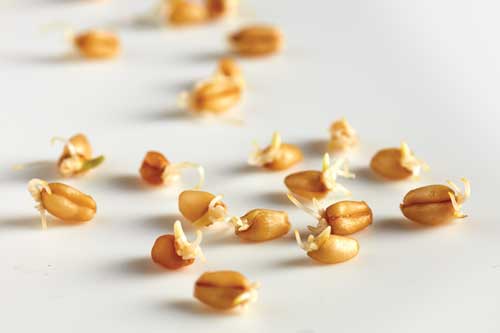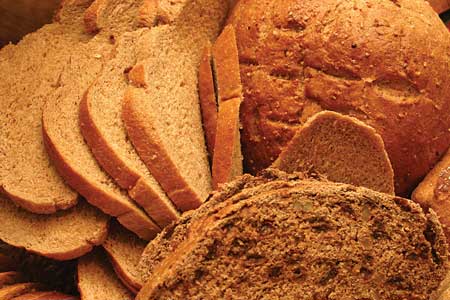Wholly Grains
NUTRACEUTICALS
 Nearly two-thirds of Americans say they are heeding the Dietary Guidelines advice to “make at least half your grains whole,” with the majority of Americans eating more whole grains than they did five years ago, according to a Whole Grains Council survey (Whole Grains Council 2015). Not surprisingly, whole wheat, oats, and brown rice are the most popular grains. And according to the survey, fewer than one in five has heard of spelt, farro, amaranth, khorasan wheat, or teff.
Nearly two-thirds of Americans say they are heeding the Dietary Guidelines advice to “make at least half your grains whole,” with the majority of Americans eating more whole grains than they did five years ago, according to a Whole Grains Council survey (Whole Grains Council 2015). Not surprisingly, whole wheat, oats, and brown rice are the most popular grains. And according to the survey, fewer than one in five has heard of spelt, farro, amaranth, khorasan wheat, or teff.
Consumers are generally aware of the nutrients and benefits of whole grains, including weight management and heart health. The Whole Grains Council survey revealed that nearly nine out of 10 (86%) of those who consume whole grains do so for the health benefits. The vitamins, minerals, protein, dietary fiber, and antioxidants present in whole grains contribute to the various benefits.
Johnson et al. (2015) provided supporting evidence that whole grains may contribute to longevity. Researchers analyzed the diets of more than 120,000 people in Denmark, Norway, and Sweden. They found that those who ate the most whole grains had significantly lower risk of death from all causes. Ptomey et al. (2015) showed that whole grains for breakfast were linked with higher test scores in students. Researchers collected data from nearly 700 elementary school students in Kansas (average age 7.5) to see how eating breakfast relates to standardized test scores. Greater servings of whole grains were significantly related to higher scores in reading comprehension and fluency and math, while fruit juice was significantly correlated with lower math and reading comprehension and fluency scores.
With the growing interest and popularity of whole grains, the door is open to create unique whole grain offerings for all eating occasions. According to the Whole Grains Council survey, breakfast remains the biggest eating occasion for whole grains, followed by dinner and lunch. On average, 37% of daily whole grains are consumed at breakfast, 27% at dinner, 22% at lunch, and just 14% as snacks.
Creativity with whole grains can already be seen in the foodservice arena. In the January 2016 issue of Bon Appétit, editors listed some of the coolest food trends for 2016. Oatmeal 2.0 was one of these trends, which the editors described as oatmeal finally getting interesting, going beyond maple syrup and brown sugar. “Think ancient grains with coconut milk (Milktooth, Indianapolis), steel-cut oats with hazelnut granola (High Street on Hudson, New York City), and local grains with roasted figs (The London Plane, Seattle).
Here is an overview of some of the whole grains consumers may soon find in a growing number of foods for every eating occasion.
--- PAGE BREAK ---
 Sprouted Grains
Sprouted Grains
Sprouted grains are garnering more consumer interest. Whole grains and seeds are soaked in water and allowed to germinate and sprout. Sprouted grains tend to have a low glycemic index and reduced amounts of carbohydrates and starch. In addition, sprouting grains can often lead to increased concentrations of various nutrients.
For example, Caceres et al. (2014) showed that sprouting brown rice can increase dietary fiber content and decrease phytic acid. Perales-Sanchez et al. (2014) found that sprouting amaranth resulted in increased antioxidant activity and flavonoid content. Additionally, protein and fiber content also increased from sprouting. Pradeep et al. (2014) also showed that antioxidant activity increased after sprouting millet.
Sprouted grains can be found in baked goods and snacks. Angelic Bakehouse, Cudahy, Wis. (angelicbakehouse.com), offers a sprouted grain flatbread. It is made with whole sprouted grains of red wheat berries, quinoa, oat groats, rye berries, barley, amaranth, and millet. Instead of using sprouted flour, Angelic crafts its full line of non-GM baked goods, including breads, buns, and flatbreads, with its proprietary sprouted mash.
Live Better Brands, Minneapolis, Minn. (gowaybetter.com), offers a unique line of sprouted chips. Way Better Snacks tortilla chips incorporate sprouted ingredients such as flaxseed, brown rice, chia seeds, quinoa, black beans, broccoli seeds, and daikon radish seeds.
Ardent Mills, Denver, Colo. (ardentmills.com), offers Sprouted White Spring Whole Wheat Flour. The act of sprouting improves bake performance. In tests, sprouted whole wheat flour performed better than its nonsprouted counterpart on several important baking measurements including loaf volume, proof times, and dough stability.
The company also offers ancient grains, including amaranth, quinoa, sorghum, millet, teff, and buckwheat, as whole seeds and flours. Its whole grain flours offer manufacturers various tools to create nutritious whole grain foods. Sustagrain is a proprietary, identity-preserved barley variety that is both low in starch and high in soluble (heart-healthy beta-glucan) and total dietary fiber. It boasts three times the fiber of oats and corn flour and 10 times the fiber of brown rice. Ultragrain is 100% whole wheat flour that offers whole grain nutrition with the taste, texture, and appearance of traditional white flour. It is milled using a unique method that retains all of the whole grain nutrition while achieving the consistency of white flour.
--- PAGE BREAK ---
 Grains Garnering Interest
Grains Garnering Interest
• Amaranth (Amaranthus hypochondriacus) has a higher protein concentration than most cereal grains. In an article in Comprehensive Reviews in Food Science and Food Safety, Montoya-Rodriguez et al. (2015) supported the concept that amaranth grain could be part of a “healthy” diet and thereby prevent chronic human diseases. Researchers conducted the review to determine bioactive peptide sequences in amaranth proteins that may prevent cardiovascular disease, cancer, and diabetes. All proteins showed high occurrence frequencies of angiotensin-converting enzyme-inhibitor peptides, as well as of dipeptidyl peptidase IV inhibitor. Other proteins showed antioxidative and glucose uptake–stimulating activity and also antithrombotic and anticancer sequences.
• Buckwheat contains higher levels of zinc, copper, and manganese than other cereal grains, according to information from the Whole Grains Council. It also provides a very high level of protein, which is well-balanced and rich in lysine. Buckwheat is high in soluble fiber and a potential source of resistant starch.
• Farro, also known as emmer, is an ancient strain of wheat. It has more fiber and protein than modern wheat.
• Kamut or khorasan wheat is an ancient grain with higher levels of protein than common wheat and more vitamin E. Whittaker et al. (2015) showed that a khorasan wheat–based replacement diet provided additional protection in patients with acute coronary syndrome. Circulating cardiovascular risk factors, including lipid parameters and markers of both oxidative stress and inflammatory status, were reduced.
• Millet is a group of small related grains including pearl millet, foxtail millet, proso millet, finger millet/ragi (Eleucine coracana), and fonio. According to the Wheat Foods Council, millet is naturally high in protein and antioxidants and can help control blood sugar and cholesterol.
It is also a gluten-free grain and especially high in magnesium.
• Quinoa is the perfect example of a lesser-known grain making its way into the mainstream market. In an article in Comprehensive Reviews in Food Science and Food Safety, Graf et al. (2015) noted that the protein quantity and quality of quinoa are generally superior to those of cereal grains in addition to the fact that it is gluten-free and highly digestible. Quinoa has a higher total protein content (12.9% to 16.5%) than barley (10.8% to 11%), oats (11.6%), rice (7.5% to 9.1%), and maize (10.2% to 13.4%), and a total protein content equal to that of wheat (14.3% to 15.4%).
Colorexa, Deerfield Beach, Fla. (colorexa.com), offers quinoa in a variety of forms: organic, white quinoa, red quinoa, black quinoa, quinoa mix, quinoa flakes, and quinoa powder. Quinoa comes in different colors, but the most common are the black, red, and white, according to information from the company. With only 222 calories per serving and 4 g of unsaturated fat, quinoa can be a low-calorie and low-fat food.
• Sorghum is an ancient whole grain that is good for those on gluten-free diets. It is naturally high in fiber, iron, and protein and rich in antioxidants, according to information from United Sorghum Checkoff, Lubbock, Texas (sorghumcheckoff.com). Sorghum digests more slowly than some other grains and has a lower glycemic index.
• Spelt (Triticum aestivum spelta) is a variety of wheat but is higher in protein than common wheat. Spelt is also high in fiber and a good source of iron and manganese.
• Teff has more than twice the iron of other grains and three times the calcium. One cup of cooked teff offers 123 mg calcium, about the same amount as in a half-cup of cooked spinach. Teff is high in resistant starch, which can help benefit blood sugar and weight management. In addition, teff is a gluten-free grain.
• Triticale is a hybrid of wheat and rye. It is higher in protein and fiber than both wheat and rye on their own. Triticale is a good source of magnesium, folate, dietary fiber, and potassium.
Next month’s Nutraceuticals section will focus on ingredients that support healthy aging.
 Linda Milo Ohr,
Linda Milo Ohr,
Contributing Editor
Denver, Colo.
[email protected]
References
Caceres, P. J., C. Martinez-Villaluenga, L. Amigo, and J. Frias. 2014. “Assessment on Proximate Composition, Dietary Fiber, Phytic Acid and Protein Hydrolysis of Germinated Ecuatorian Brown Rice.” Plant Foods Hum. Nutr. 69(3): 261–7.
Graf, B. L., P. Rojas-Silva, L. E. Rojo, J. Delatorre-Herrera, M. E. Baldeon, and I. Raskin. 2015. “Innovations in Health Value and Functional Food Development of Quinoa (Chenopodium quinoa Willd).” Comprehensive Reviews in Food Science and Food Safety 14: 431–445.
Johnson, N. F., K. Frederiksen, J. Christensen, G. Skeje, E. Lund, R. Landberg, I. Johansson, L. M. Nilsson, J. Jalkjaer, A. Olsen, K. Overvad, and A. Tjonneland. 2015. “Whole-grain Products and Whole-grain Types are Associated with Lower All-cause and Cause-specific Mortality in the Scandinavian HELGA Cohort.” Br. J. Nutr. 114(4): 608–23.
Montoya-Rodriguez, A., M. A. Gomez-Favela, C. Reyes-Moreno, J. Milan-Carrillo, and E. Gonzalez de Mejia. 2015. “Identification of Bioactive Peptide Sequences from Amaranth (Amaranthushypochondriacus) Seed Proteins and Their Potential Role in the Prevention of Chronic Diseases.” Comprehensive Reviews in Food Science and Food Safety 14(2): 139–158.
Perales-Sanchez, J. X., C. Reyes-Moreno, M. A. Gomez-Favela, J. Milan-Carrillo, E. O. Cuevas-Rodriquez, A. Valdez-Ortiz, and R. Guitierrez-Dorado. 2014. “Increasing the Antioxidant Activity, Total Phenolic and Flavonoid Contents by Optimizing the Germination Conditions of Amaranth Seeds.” Plant Foods Hum. Nutr. 69(3): 196–202.
Pradeep, P. M. and Y. N. Sreerama. 2015. “Impact of Processing on the Phenolic Profiles of Small Millets: Evaluation of Their Antioxidant and Enzyme Inhibitory Properties Associated with Hyperglycemia.” Food Chem. 169: 455–63.
Ptomey, L. T., F. L. Steger, M. M. Schubert, J. Lee, E. A. Willis, D. K. Sullivan, A. N. Szabo-Reed, R. A. Washburn, and J. E. Donnelly. 2015. “Breakfast Intake and Composition Is Associated with Superior Academic Achievement in Elementary Schoolchildren.” J. Am. Coll. Nutr. Advance online publication. Dec 23: 1–8.
Whittaker, A., F. Sofi, M. L. E. Luisi, E. Rafanelli, C. Fiorillo, M. Becatti, R. Abbate, A. Casini, G. F. Gensini, and S. Benedettelli. 2015. “An Organic Khorasan Wheat-Based Replacement Diet Improves Risk Profile of Patients with Acute Coronary Syndrome: A Randomized Crossover Trial.” Nutrients 7(5): 3401–3415.
Whole Grains Council. 2015. “Survey: Most Americans Now Make Half Their Grains Whole.” Press release, Aug. 31. Whole Grains Council, Boston, Mass. wholegrainscouncil.org.


